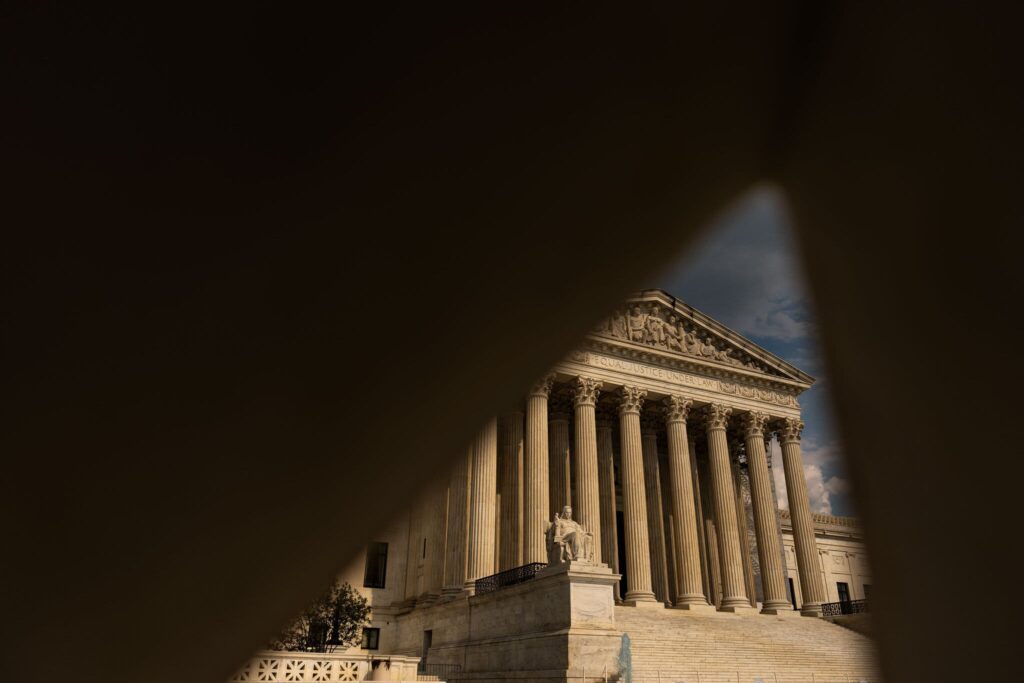The Supreme Court heard arguments on Tuesday over whether a truck driver fired for failing a drug test after using a “wellness product” which was falsely advertised to be free of THC may sue the manufacturer under a federal racketeering law.
A majority of the justices seemed ready to side with the driver, Douglas Horn, on the narrow question before them: whether he could satisfy the law’s requirement that he had been injured in his “business or property.” But that is not the only hurdle Mr. Horn must clear to win under the law, the Racketeer Influenced and Corrupt Organizations Act, or RICO.
“There’s a whole lot more to RICO than simply damages,” Justice Sonia Sotomayor said, indicating that any victory Mr. Horn might win would be provisional. If the court rules for him, it will return his case to the lower courts for further proceedings.
The case, Medical Marijuana Inc. v. Horn, No. 23-365, started after Mr. Horn came across an article in High Times, a magazine that covers the business and culture of marijuana, concerning a “wellness product” called Dixie X. It was said to be rich in CBD, a component of hemp that does not produce the high associated with marijuana, but to contain “0 percent THC,” the psychoactive ingredient in cannabis.
Knowing he faced random drug tests as a commercial truck driver, Mr. Horn said he conducted additional research, watching YouTube videos, visiting the manufacturer’s website and calling the company’s toll-free phone number. All confirmed that the product contained no THC.
After using Dixie X, Mr. Horn failed a drug test and was fired. Suspecting that the product was to blame, he bought another bottle and had it tested. The testing company found that it contained THC and refused to mail it back to Mr. Horn, fearing penalties under federal drug laws.
Mr. Horn sued under RICO, a law that was initially aimed at organized crime and allows an award of triple damages to plaintiffs who can show, among many other things, that the defendants’ racketeering activity injured them in their “business or property.” That phrase, the Supreme Court has said, excludes suits for personal injuries.
Mr. Horn said three defendants — Medical Marijuana Inc., Dixie Holdings and Red Dice Holdings — had engaged in a pattern of racketeering carried on through an enterprise that included mail and wire fraud.
A federal trial judge dismissed the suit, saying that Mr. Horn’s injury was personal. The U.S. Court of Appeals for the Second Circuit disagreed, saying that “the phrase ‘business or property” focuses on the nature of the harm, not the source of the harm.”
Lisa S. Blatt, a lawyer for the defendants, said on Tuesday that Mr. Horn’s injury was “unwanted ingestion of THC,” which she said was a personal injury.
“I try to make the Supreme Court accessible to readers. I strive to distill and translate complex legal materials into accessible prose, while presenting fairly the arguments of both sides and remaining alert to the political context and practical consequences of the court’s work.”
Justice Ketanji Brown Jackson disagreed. “He’s not claiming that he got ill because of the product,” she said of Mr. Horn. “He’s not saying he was personally injured. He didn’t even know that he had ingested THC until the testing and the firing.”
Justice Elena Kagan said the defendants were fighting on the wrong battleground. “If you’re harmed when you lose a job,” she said, “then you’ve been injured in your business.”
The better argument, though not one before the court, Justice Kagan said, was that the defendants had not caused Mr. Horn’s injury directly enough to satisfy the requirement of “proximate causation.”
Justice Clarence Thomas put the point this way: “Medical Marijuana did not fire you.”
Easha Anand, a lawyer for Mr. Horn, conceded that proving causation was a “heavy burden.”
But Justice Samuel A. Alito Jr. sounded doubtful.
“Wouldn’t you argue that a company that advertises its product as being completely free of THC, not just that it has only such an infinitesimal amount that it’s not going to get people high, but it is completely free of THC, is appealing to a category of potential customers who, for some reason, want to make sure that they don’t ingest even a tiny, tiny amount of THC?” he asked.
“And when someone who purchases the product then suffers the consequences of having a very small amount of THC in that person’s system, that is an entirely foreseeable result?”
Ms. Anand, having raised the prospect of losing on a different ground in order to win on the one before the court, retreated. “We think we’re going to meet the proximate cause test,” she said.
H/T: www.nytimes.com



